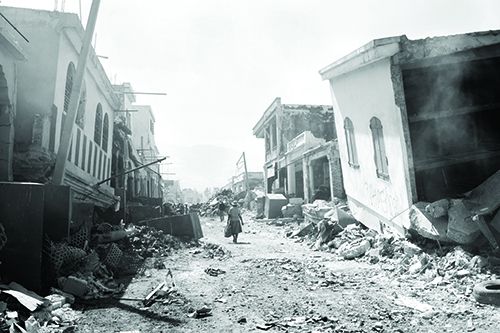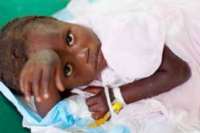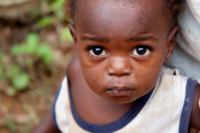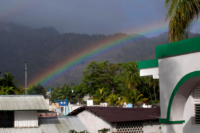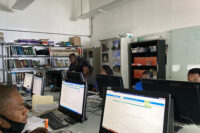From my vantage point on the porch, just outside my part-time residence at Hôpital Sacré Coeur, the late afternoon light had begun to gild my tropical surroundings in tawny ambers and silky golds. I had just sat down for a rest after a very long day of trying to repair the failing electrical system at the small hospital in Northern Haiti. The air was quite still and my mind had drifted to my family back in Massachusetts, when just before 5 p.m., I heard a deep rumble growing with intensity off in the distance. The earth began shaking and the rumble changed to a loud roar as the sound of masonry falling from its perch onto tin roofs added to a discord of barking dogs and panicked shouts from frightened people.
I was witnessing the opening act of that terrible tragedy that took place in Haiti in 2010, an earthquake of a 7.0 magnitude. It was the beginning moments of a saga that would test the resolve and compassion of many thousands of people, both victims and volunteers, and would challenge humanity to finally look at the profound problems which had festered in this island petri dish for more than two hundred years.
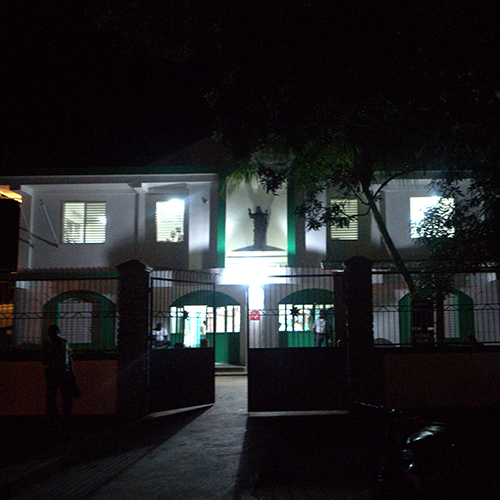 The next few days were measured not in hours but in a series of flashpoints, filled with drama tied to individual acts of kindness, selflessness and empathy. Too many people had perished in a matter of seconds and thousands more were left buried under the rubble of a poorly constructed society. Despite its unique beginning over two hundred years ago as the first free black state, it always seemed to me as though Haiti was never meant to be an independent country. Its past reads like many other exploited lands, where avarice and greed by more developed societies had ruled their fate with the unique exception that it once had great wealth and now was left in ecological ruin.
The next few days were measured not in hours but in a series of flashpoints, filled with drama tied to individual acts of kindness, selflessness and empathy. Too many people had perished in a matter of seconds and thousands more were left buried under the rubble of a poorly constructed society. Despite its unique beginning over two hundred years ago as the first free black state, it always seemed to me as though Haiti was never meant to be an independent country. Its past reads like many other exploited lands, where avarice and greed by more developed societies had ruled their fate with the unique exception that it once had great wealth and now was left in ecological ruin.
For the past thirty years, Hôpital Sacré Coeur had been a point of light in a sea of dark uncertainty. Its role during this latest conflagration meant that several thousand people, both victims of the earthquake and their families, had a chance to cling to their fragile lives while the country and other world member states sought solutions to the impossible. It seemed for a brief time in that moment, planet earth was shaken into action to find a benevolent response to an overwhelming catastrophe. But connecting that response to those on the ground would prove elusive and surprisingly difficult. The major players in such disasters, like the Red Cross and UNICEF, would struggle to get to all those who were in need. The country was in a terrible state. Life in the former French colony had always been difficult. There had never been enough food or shelter. Clean water was found almost by accident and electricity was as rare and elusive as lightning itself. Even basic dignity was something few could afford. With those meager resources virtually wiped out in a single, powerful event, the task of caring for so many injured and burying the dead immediately fell upon the few who were already in country.
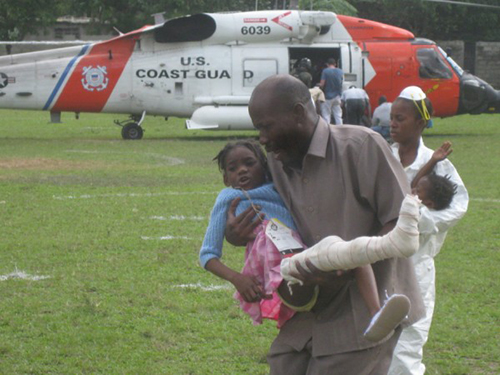 It took some time for those in charge of the recovery to find Hôpital Sacré Coeur, which is located in the small mountain valley hamlet of Milot. Several aid organizations toured our facility in those first two days after the initial impact, but felt we had little to offer given our size and remote location from the disaster. But soon, others less fastidious and perhaps with more knowledge of the scope of the disaster found out about us and the victims of this calamity began flooding into our open arms. They came on foot, in buses and autos and by air vis-a-vis the U.S. Coast Guard and U.S. Navy helicopter response teams. Almost immediately, our limited resources were taxed.
It took some time for those in charge of the recovery to find Hôpital Sacré Coeur, which is located in the small mountain valley hamlet of Milot. Several aid organizations toured our facility in those first two days after the initial impact, but felt we had little to offer given our size and remote location from the disaster. But soon, others less fastidious and perhaps with more knowledge of the scope of the disaster found out about us and the victims of this calamity began flooding into our open arms. They came on foot, in buses and autos and by air vis-a-vis the U.S. Coast Guard and U.S. Navy helicopter response teams. Almost immediately, our limited resources were taxed.
Our hospital was designed for 70 beds, many of which were occupied by the normal flow of patients. After the first day of receiving victims, our population was overflowing. The number grew to more than one hundred and twenty-five souls. And like the story of the loaves and fishes when Jesus fed the multitude from a couple of fish and a few small loaves of bread, more beds appeared and were placed in every conceivable location; in adjacent schools, town buildings, temporary tents and even a few personal dwellings of local residents willing to undertake such a responsibility for the least injured.
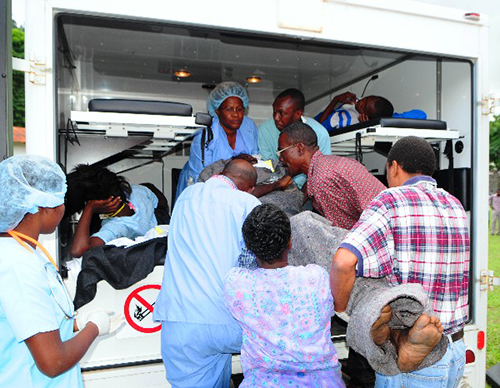 By the fourth day, we had run out of everything. The condition of most victims was extreme. Men, women and children came to us after having been buried in the rubble that was once Port au Prince, some for days and many needed radical surgeries that required amputation of limbs and aggressive treatment for sepsis. Teams of volunteers arrived from the States and as far away as Ireland and England, Europe and the Middle East. One young couple had travelled all the way from Australia to help. Most brought suitcases, boxes and duffle bags full of medicines and sterile supplies to facilitate the work with an increasing numbers of casualties that arrived daily. But the thing that eluded us most was food and clean water. Because all recovery resources were pointed to Port au Prince by the large aid agencies, we had to forage for these commodities.
By the fourth day, we had run out of everything. The condition of most victims was extreme. Men, women and children came to us after having been buried in the rubble that was once Port au Prince, some for days and many needed radical surgeries that required amputation of limbs and aggressive treatment for sepsis. Teams of volunteers arrived from the States and as far away as Ireland and England, Europe and the Middle East. One young couple had travelled all the way from Australia to help. Most brought suitcases, boxes and duffle bags full of medicines and sterile supplies to facilitate the work with an increasing numbers of casualties that arrived daily. But the thing that eluded us most was food and clean water. Because all recovery resources were pointed to Port au Prince by the large aid agencies, we had to forage for these commodities.
Traditional supplies in the North were quickly depleted by all the refugees who fled the South amid daily aftershocks and the destruction of so many homes.
In response to those needs, I found myself walking the streets of Milot looking for anything that might be of use. The day was waning as I made my way towards one of our temporary camps that was hurriedly constructed in a former banana plantation, when I saw a frail, old woman wrapped in rags shuffling towards me.
She was slightly bent and holding out a small black plastic sack waving it slowly from side to side. My Kreyòl was poor and her voice was soft but I caught the word “grangou,” an expression I had heard many times during my stays in Haiti. It means “hungry.”
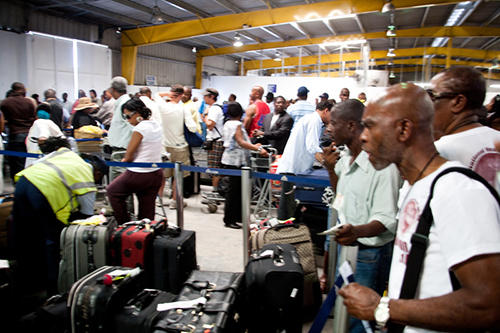 At first I was confused, was she asking me to feed her? What was in the bag and what did she want from me? I saw one of our interpreters walking on the other side of the road and asked him to explain what the woman wanted. I was irritated from a long day of struggle and very tired. The days recently past had pushed me to my physical limits. I had only slept in short spurts since the quake and I was operating on a nearly depleted supply of adrenaline.
At first I was confused, was she asking me to feed her? What was in the bag and what did she want from me? I saw one of our interpreters walking on the other side of the road and asked him to explain what the woman wanted. I was irritated from a long day of struggle and very tired. The days recently past had pushed me to my physical limits. I had only slept in short spurts since the quake and I was operating on a nearly depleted supply of adrenaline.
The interpreter bent down to listen to the woman’s plea and then asked her to repeat it again to make sure he understood. He twisted his head towards me and stood up holding his hand lightly on her shoulder. She was less than five feet tall and I felt uncomfortable looming over her like some judge awaiting the details of her defense. The interpreter smiled and said with a little chagrin, “She wants you to take this rice and feed someone who is hungry.” The words made me pause as a frown descended upon my face. My mind was shaking itself out of fatigue and trying to get it wrapped around what I had just heard. I asked the interpreter to repeat what he had just said. “She wants you to have this rice and find someone who is hungry and feed them,” he repeated.
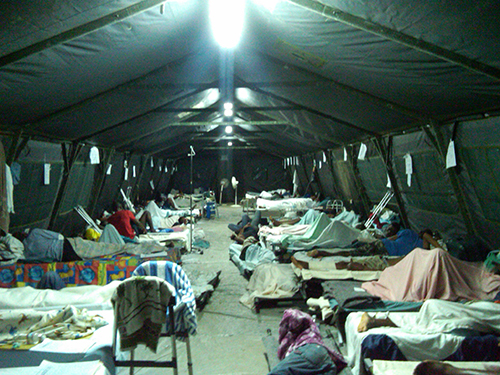 The woman must have read something in my face as she reached up to the interpreter with her free hand and pulled him down to hear what she wanted to say. He rose up again and with some resolve said in a hoarse voice, “She is very sorry that the amount is so small but this is all she had left in her house for the rest of the week. She wants you to take it.”
The woman must have read something in my face as she reached up to the interpreter with her free hand and pulled him down to hear what she wanted to say. He rose up again and with some resolve said in a hoarse voice, “She is very sorry that the amount is so small but this is all she had left in her house for the rest of the week. She wants you to take it.”
That was the moment when I first felt the true presence of Christ in the midst of the madness that surrounded me. It was when I realized that being a Christian in such a dark place filled with all this suffering would make a difference and I began to believe that there was a compelling reason for me to be there and a true and valued purpose to endure.
At once, I wanted to kiss that old woman for her extraordinary gift and at the same time ask for her forgiveness for assuming she was begging for herself in such a time of need. I took the tiny parcel of rice, no more than a half a cup, pressed her wrinkled fingers into mine and promised to find someone who was hungry and feed them. With that, the woman turned towards the town and disappeared into the fading light, most assuredly returning to a bare cupboard and another long night trying to find sleep on an empty stomach.
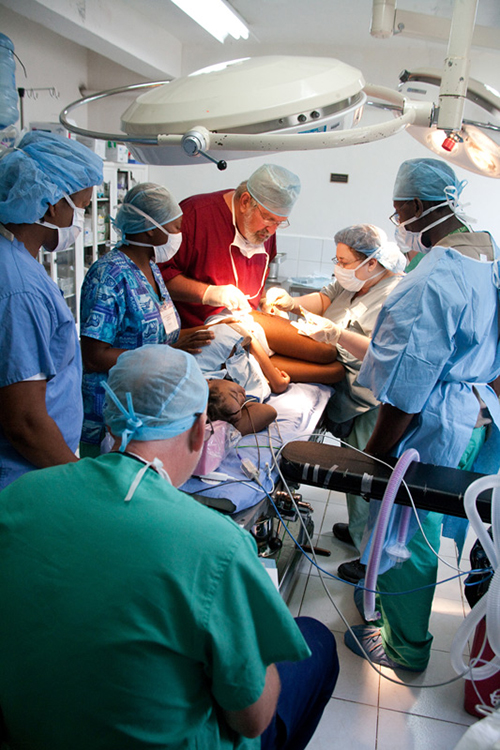 I left that place and walked over to the National School where we were caring for over one hundred and fifty victims recovering from various injuries and trauma. I made my way to the place where local women had begun to cook for these traumatized strangers from the South. The food came mostly from donations rendered out of the community and a few smaller NGO’s who operated in the area. Large metal pots were lapped by smoky charcoal fires while steam rose upward as the kettles’ contents of white rice swelled inside.
I left that place and walked over to the National School where we were caring for over one hundred and fifty victims recovering from various injuries and trauma. I made my way to the place where local women had begun to cook for these traumatized strangers from the South. The food came mostly from donations rendered out of the community and a few smaller NGO’s who operated in the area. Large metal pots were lapped by smoky charcoal fires while steam rose upward as the kettles’ contents of white rice swelled inside.
I found a woman whom I knew spoke English and asked her to boil my rice for me. She looked puzzled but took the bag and was about to pour it into another parcel much larger that lay next to the fire when I quickly grabbed the sack from her and explained that I wanted to cook this bit separately.
The other women around the fire drew slightly back from my abrupt gesture and held me with a look of disapproval for my rash actions.
I quickly explained that this was a gift from the old woman and I wanted to faithfully honor her request and cook this small amount for someone who was hungry. The woman I knew explained to the others who seemed content to forgive my aggression and mark it down as one more of my peculiarities by which I had become to be known. Quickly, a small pot appeared and soon the water was boiling with the contents of the tiny sack dancing happily within. I had to attend to a water supply problem elsewhere and asked my friend to keep this rice separate until I returned.
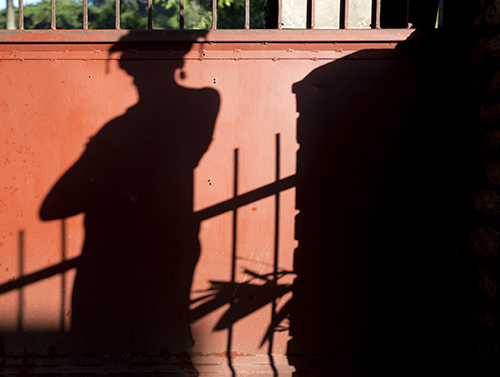 Within the hour, I was back at the cooking fire and the women sitting around the glowing embers giggled as I approached. No doubt in my absence, they had stitched together an entire story filling in details they supposed about the crazy blanc, the rice and the old lady that would suit their purposes for retelling it in the coming days. Haitians love to tell stories and it would take no time for such an event to find its way to the edge of rivers where laundry is washed or in jungle gardens where the yams and beans are attended to. My friend rose from her squat and handed me a small tin plate that was nestled near the coals. I thanked her and left the fire to seek out a worthy recipient of the old woman’s gift.
Within the hour, I was back at the cooking fire and the women sitting around the glowing embers giggled as I approached. No doubt in my absence, they had stitched together an entire story filling in details they supposed about the crazy blanc, the rice and the old lady that would suit their purposes for retelling it in the coming days. Haitians love to tell stories and it would take no time for such an event to find its way to the edge of rivers where laundry is washed or in jungle gardens where the yams and beans are attended to. My friend rose from her squat and handed me a small tin plate that was nestled near the coals. I thanked her and left the fire to seek out a worthy recipient of the old woman’s gift.
In the shadows between hastily strung bare electric light bulbs, I saw an old man lying on a crude bed that I had made earlier in the day. It consisted of four concrete blocks laid on their sides with three rough and irregularly sawn “planchs” or bread fruit wood planks straddling the gap. He was staring into the surrounding darkness perhaps thinking of his home and those he loved who were sill back in the chaos of Port au Prince. As his eyes met mine, I asked if he had eaten today. His look at the white grains on the tin plate spoke the answer, he had not. I sat next to him on the ground and offered the rice.
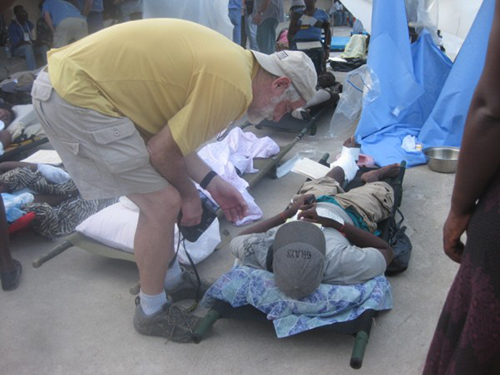 His leg was badly mangled, shrouded in gauze and tape and there was a recently closed wound over his left eye that bore protruding stitches sans any covering. I didn’t even have a spoon to offer but that was quickly remedied as he sat up, took the plate and began shoveling the plain rice into his mouth with his fingers. I looked about for a cup to get him some fresh water to drink but found only a half empty water bottle laying near the foot of his bed. I rose to find a place to wash it out and replenish its contents but he just motioned for it and I handed it over to him. Our transaction was mostly silent as the contents of the plate were quickly consumed. He handed back the plate and laid his head down against the small bundle of his remaining possessions which made his pillow and closed his eyes. He smiled to himself and said “mèsi” or thank you to me. I left him there as he appeared to drop into some well needed sleep.
His leg was badly mangled, shrouded in gauze and tape and there was a recently closed wound over his left eye that bore protruding stitches sans any covering. I didn’t even have a spoon to offer but that was quickly remedied as he sat up, took the plate and began shoveling the plain rice into his mouth with his fingers. I looked about for a cup to get him some fresh water to drink but found only a half empty water bottle laying near the foot of his bed. I rose to find a place to wash it out and replenish its contents but he just motioned for it and I handed it over to him. Our transaction was mostly silent as the contents of the plate were quickly consumed. He handed back the plate and laid his head down against the small bundle of his remaining possessions which made his pillow and closed his eyes. He smiled to himself and said “mèsi” or thank you to me. I left him there as he appeared to drop into some well needed sleep.
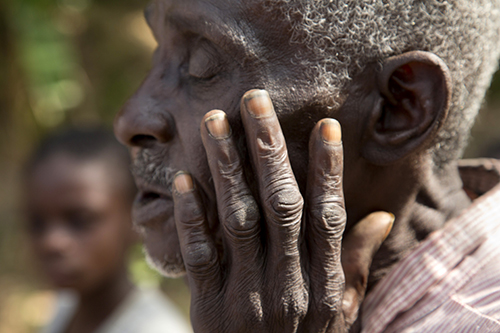 As I walked back to the road through many beds scattered about the grounds, a fresh batch of injured had just arrived by bus and were being triaged on an outdoor basketball court at the front of the school. I was definitely feeling the same fatigue as the old man but for different reasons. I continued back to the CRUDEM compound where scores of medical relief workers were shining flashlights like errant fireflies onto the ground and inside their tents, looking for a change of clothes or a snack bar for nourishment. I went to the corner of the Mission House porch where a mattress covered with mosquito netting served as my bed and collapsed for a few hours of rest.
As I walked back to the road through many beds scattered about the grounds, a fresh batch of injured had just arrived by bus and were being triaged on an outdoor basketball court at the front of the school. I was definitely feeling the same fatigue as the old man but for different reasons. I continued back to the CRUDEM compound where scores of medical relief workers were shining flashlights like errant fireflies onto the ground and inside their tents, looking for a change of clothes or a snack bar for nourishment. I went to the corner of the Mission House porch where a mattress covered with mosquito netting served as my bed and collapsed for a few hours of rest.
The hushed din about me, of others rushing on and off shifts, died slowly away; and, my thoughts turned back to the old woman who had tasked me with her charity.
I was reminded of that wonderful scripture reading in Mark that told of a similar woman who had given all she had in two copper coins to the treasury of the temple while other members of the congregation gave from their largesse. Laying in the dark, I felt the pang of hunger myself and appreciated this gift even more. I knew that I would eat tomorrow if I put a little energy into the task but in the woman’s case, she most likely would not.
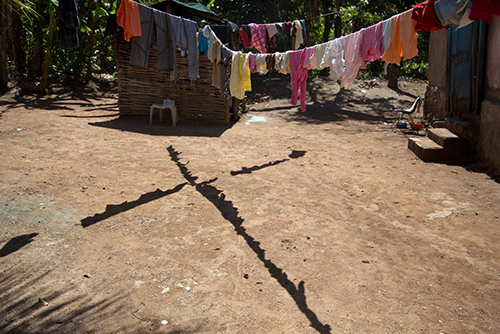 This event took place more than four years ago, but many of the needs that were prevalent during that time remain. Our hospital continues to suffer from chronic shortages of medicines, surgical supplies, and money for fuel, staff salaries and support for replacing those portions of the infrastructure that still need to be upgraded. But much too has happened that is positive in this land of disappointment and failed initiatives, especially and sometimes uniquely in Milot where Hôpital Sacré Coeur resides.
This event took place more than four years ago, but many of the needs that were prevalent during that time remain. Our hospital continues to suffer from chronic shortages of medicines, surgical supplies, and money for fuel, staff salaries and support for replacing those portions of the infrastructure that still need to be upgraded. But much too has happened that is positive in this land of disappointment and failed initiatives, especially and sometimes uniquely in Milot where Hôpital Sacré Coeur resides.
In the spirit of the two women I mentioned earlier, the one I met in the street and the one I met in Mark 12:42, I have seen much accomplished through the example of their sacrifice. Many of those of you who read this story are personally responsible for continuing that legacy of charity and often give more than you can afford. Others are new to our cause and have given for the first time. I can attest without qualification that the people of Haiti are indeed grateful for such kindness and depend, for the time being, on it to continue. Together we can make a difference and perhaps change the course of such future events to have different outcomes. May God continue to bless our work in Haiti.


